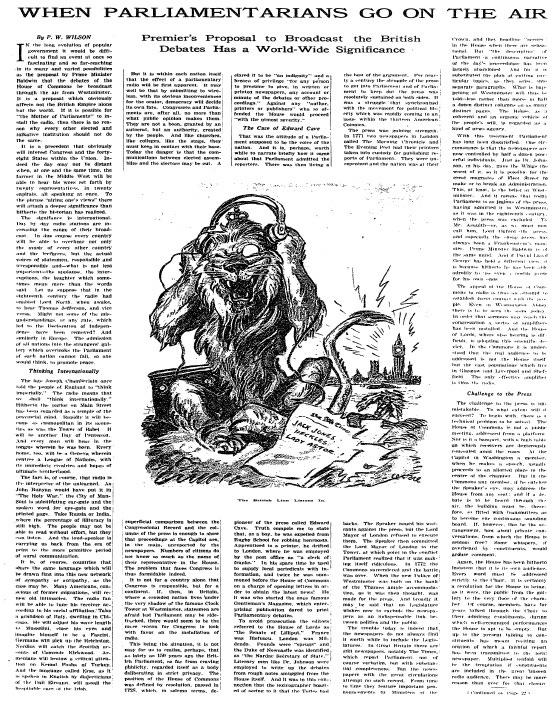When Parliamentarians Go On the Air
Some members of both the British Parliament and U.S. Congress wanted to broadcast the government's proceedings over the radio, a 1925 New York Times Magazine article reported. Neither body would actually regularly do so for more than 50 years.
As the journalist P.W. Wilson wrote, in an article featuring an illustration of England's lion national symbol wearing headphones:
Prime Minister Baldwin [proposes] that the debates of the House of Commons be broadcast through the air from Westminster. It is a proposal which obviously affects not the British Empire alone but the world.
...
Indeed the day may not be distant when, at one and the same time, the farmer in the [Midwest] will be able to hear his woes set forth by twenty representatives, in twenty capitals, all speaking at once. To the phrase "airing one's views" there will attach a deeper significance than hitherto the historian has realized.
In the U.K., the idea wouldn't come to fruition until 1975 (as a temporary experiment) and 1978 (on a permanent basis).
A very similar story in the U.S. A few individual congressional events had been broadcast on the radio, even by 1925: the first such congressional proceeding and the first such presidential address to Congress were both broadcast in 1922. However, the first regular congressional proceeding broadcast on radio wouldn't occur until 1978, the same year as the practice become permanent in the U.K.
On the more visual side, with cameras and television, C-SPAN launched for the House of Representatives in 1979 and the Senate in 1986.
Now, the question is whether the Supreme Court should follow suit. The highest judicial body still only releases audio of their proceedings, even in 2025. The Cameras in the Courtroom Act would require the Supreme Court to broadcast on television and release video online.
Odds of passage seem slim in the Republican-controlled Congress. The House version currently has no Republican cosponsors, while the Senate version only has one Republican cosponsor: Sen. Chuck Grassley (R-IA).
Some of the current justices express concern that cameras in the courtroom would lead to grandstanding, playing to the cameras, and trying to go viral. I can see their point... it's very dubious that televising, say, presidential debates has led to robust and thoughtful discussions of public policy ideas in that particular forum.
When Parliamentarians Go On the Air: Premier's Proposal to Broadcast the British Debates Has a World-Wide Significance
Published: Sunday, April 12, 1925


